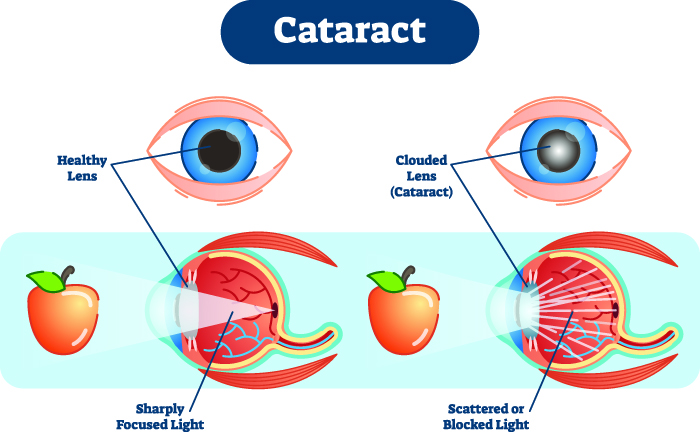Cataract Surgery in Tardeo, Mumbai
A cataract is a vision-impairing disease characterized by the clouding of the natural lenses of the eyes. A cataract is a common condition in elderly people. In most cases, cataracts progress slowly and can affect one or both the lenses.

What do we need to know about cataract?
The clouding of the lens can cause diffraction of light entering the eyes. This in turn can cause vision impairment and may lead to eventual blindness.
Fortunately, with advancements in medical technology and surgical procedures, most cataracts can be treated at any stage of their development. Ophthalmology hospitals in Koramangala offer the best care and treatment of all kinds of cataracts.
What are the types of cataracts?
Based on the location and the causes of cataract in the eye, they are classified as follows:
- Nuclear cataract
- Cortical cataract
- Posterior capsular cataract
- Congenital cataract
- Traumatic cataract
What are the symptoms of cataract?
Some of the common symptoms you may notice include:
- Blurry vision
- Difficulting in focussing at night
- Sensitivity to light and glare
- Difficult to discern colors
- Amblyopia (lazy eye) - decreased eye-sight
- Double vision
What are the causes?
Most cataracts are caused due to age-related changes in the eyes. Some of the other underlying risk factors that contribute to the development of cataract include:
- Smoking
- Diabetes
- Eye injury
- Family history of cataracts
- Nutrition deficiency
- Alcohol consumption
- Exposure to ultraviolet rays
- Ocular adverse effects caused by long-term steroid medications
- Congenital cataract present at birth
To seek treatment, you can visit ophthalmology hospitals in Tardeo as well.
When do you need to consult a doctor for a cataract?
If you`re experiencing any warning symptoms of cataracts or facing visual difficulties in your normal activities such as visual glare and difficulty in reading, it is better to consult an ophthalmologist to understand the underlying cause and treatment options.
You can request an appointment at Apollo Spectra Hospitals, Tardeo, Mumbai.
Call 1860 500 2244 to book an appointment.
How is cataract treated?
The treatment for cataracts usually depends on the severity of the visual impairment it causes. For mild and early cases, your doctor may recommend eyeglasses or a magnifying lens to help you see better. However, if the symptoms progress to a point where they start affecting your ability to do normal activities, your doctor may suggest surgery. Some of the most commonly suggested cataract removal surgical procedures include:
- Minimally invasive surgery:
- Phacoemulsification: Phacoemulsification is a modern surgical technique commonly used to treat cataracts. This technique uses a special phaco-probe that gives off ultrasound to break the clouded lens in the eye. Then the broken cloudy lens is removed and replaced by an artificial lens via a small incision in the eye.
- The main benefit of phacoemulsification is attributed to the minimal incisions making the surgery less complicated.
- Large incision surgery:
- Extracapsular cataract extraction (ECCE): ECCE involves partial removal of the lens, leaving the elastic covering of the lens to allow implantation of an artificial lens. This type of large incision eye surgeries is less suggested due to its complexity and complication.
- Laser surgery: It is also called Refractive Laser-Assisted Cataract Surgery. It is an advanced type of cataract surgery that uses the laser to make a precise incision in the eye. The use of the laser to make incisions can reduce the risk of swelling and fastens the recovery after surgery.
What are the complications?
Some of the most common complications from cataract surgery include:
- Surgical infection
- Inflammation of the eyes
- Retinal detachment
- Ocular hypertension
- Ptosis - drooping of eyelids
- Light sensitivity
Conclusion
Fortunately, most cases of cataracts can be treated with day case operations. The advancement in modern surgical techniques and procedures provides better visual outcomes than were previously possible.
Some of the following steps may reduce the risk of developing a cataract:
- Quit smoking
- Limit alcohol consumption
- Get regular eye checkups
- Limit direct exposure to sunlight or UV rays by wearing sunglasses outside your home
- Incorporate healthy eating habits
The chances of you getting a cataract after cataract surgery are extremely rare, as during surgery the clouded lens gets replaced by an artificial lens. However, in a few cases, the leftover capsule after surgery can cause cloudiness mimicking the symptoms of cataracts.
The recovery from cataract surgery depends on several factors: the size of the cataract, age, overall medical condition, type of surgery and anesthesia used. Most individuals can adapt to the new intraocular lens and see better within 24 hours of the surgery. However, for some, it can take some days to readjust to an intraocular lens.
Symptoms
Our Doctors
DR. NEETA SHARMA
MBBS, DO (Ophthal), ...
| Experience | : | 31 Yeras Experience |
|---|---|---|
| Speciality | : | Ophthalmology... | Location | : | Chembur |
| Timings | : | Thur, Fri : 10:00 AM... |
DR. PALLAVI BIPTE
MBBS, MS (Ophthalmol...
| Experience | : | 21 Yeras Experience |
|---|---|---|
| Speciality | : | Ophthalmology... | Location | : | Chembur |
| Timings | : | Mon - Wed, Fri & Sat... |
DR. NUSRAT BUKHARI
MBBS, DOMS, Fellowsh...
| Experience | : | 12 Yeras Experience |
|---|---|---|
| Speciality | : | Ophthalmology... | Location | : | Tardeo |
| Timings | : | Mon - Fri : 9:00 AM ... |
Our Top Specialities
NOTICE BOARD
CONTACT US
CONTACT US
 Book Appointment
Book Appointment





.svg)
.svg)
.svg)
.svg)








